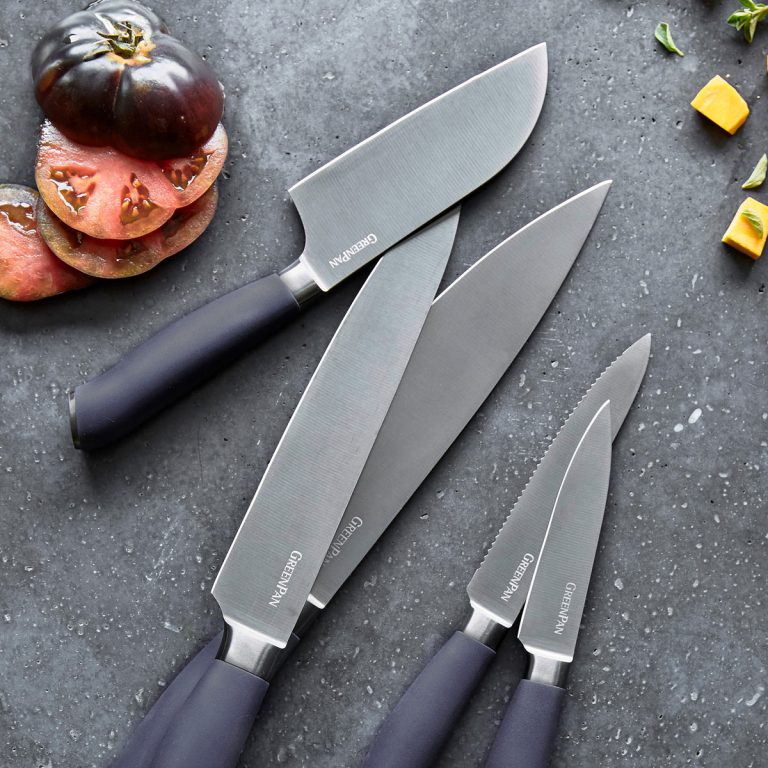Are you considering a kitchen upgrade or simply curious about the latest trends in cookware? Titanium kitchen products are gaining popularity for their modern appeal and impressive durability.
But before you make a purchase, it’s important to weigh the pros and cons. Would you love cookware that promises longevity and excellent performance? Or are you concerned about the potential downsides that might impact your cooking experience? This article is here to help you make an informed decision.
We’ll explore the benefits and drawbacks of titanium kitchen products, giving you the insights you need to decide if they’re the right fit for your kitchen. Dive in, and discover whether titanium is the secret ingredient missing from your culinary adventures!

Credit: www.amazon.com
Benefits Of Titanium Kitchen Products
Titanium kitchen products are gaining popularity for their unique advantages. They offer benefits that enhance cooking experiences. These products are known for durability and performance. Discover why titanium is favored by many culinary enthusiasts.
Durability And Strength
Titanium is incredibly strong. It withstands daily wear and tear. Kitchen tools made from titanium last longer. They resist bending and breaking. This strength makes them reliable.
Corrosion Resistance
Titanium does not rust easily. It holds up well against moisture. This quality prevents damage over time. It keeps kitchen products looking new. Rust-free tools are safer to use.
Lightweight Design
Titanium is lightweight. It offers easy handling. This feature is ideal for extended use. Cooking becomes less tiring. Lightweight tools enhance comfort in the kitchen.
Heat Conductivity
Titanium conducts heat efficiently. It distributes heat evenly. This ensures consistent cooking results. Foods are cooked to perfection. Heat conductivity improves cooking precision.
Aesthetic Appeal
Titanium has a sleek look. It adds elegance to kitchen spaces. The metallic finish is eye-catching. It complements modern kitchen designs. Aesthetic appeal enhances kitchen ambiance.

Credit: fromourplace.com
Drawbacks Of Titanium Kitchen Products
Titanium kitchen products come with several benefits. Yet, they aren’t without flaws. These products, though strong, have a few drawbacks. Understanding these can help you make informed choices. Consider the following potential issues before purchasing.
Cost Considerations
Titanium kitchen items are often pricey. This is due to the high cost of raw titanium. Manufacturing processes for titanium products are also costly. This adds to the final price. For budget-conscious shoppers, this can be a significant deterrent.
Limited Availability
Not all stores carry titanium kitchen products. Their availability is often limited. Specialty stores or online platforms are usually your best bet. This limits the ease of purchase. You may need to plan ahead to get what you need.
Maintenance Requirements
Titanium products require specific care. They often need hand washing to maintain their finish. Avoid abrasive cleaning tools to prevent damage. This can make maintenance slightly more time-consuming. Consider your lifestyle before committing.
Potential For Surface Scratches
Titanium is tough but not scratch-proof. Improper handling can lead to surface scratches. Using metal utensils can increase this risk. Scratched surfaces can affect the appearance. This may be a concern for some users.
Comparing Titanium With Other Materials
In the world of kitchenware, material choice matters. Titanium kitchen products offer unique benefits. But how do they stack up against traditional materials? Here’s a closer look at how titanium compares with stainless steel, aluminum, and copper. Understanding these differences will help you make informed kitchen decisions.
Titanium Vs Stainless Steel
Titanium is lighter than stainless steel. This makes handling easier. Stainless steel is more affordable and widely available. It is also resistant to rust and stains. Titanium, on the other hand, is stronger and more durable. It can withstand higher temperatures. This makes titanium ideal for heavy-duty cooking tasks. Both materials are non-reactive, so they’re safe for all foods. Consider your budget and cooking needs when choosing.
Titanium Vs Aluminum
Aluminum is a popular choice due to its low cost. It heats up quickly, saving time in the kitchen. However, it is less durable than titanium. Over time, aluminum can warp or scratch. Titanium is more durable and retains its shape longer. It is also non-reactive, unlike aluminum, which can react with acidic foods. This makes titanium a safer option for many recipes. Think about longevity and safety when deciding.
Titanium Vs Copper
Copper is known for its excellent heat conductivity. It distributes heat evenly, which is great for precise cooking. However, copper requires regular maintenance to prevent tarnishing. Titanium needs less upkeep and remains shiny longer. Copper can also react with some foods, altering flavors. Titanium’s non-reactive nature keeps food tasting pure. For those seeking efficiency and minimal maintenance, titanium stands out.

Credit: fromourplace.com
Popular Titanium Kitchen Products
Titanium kitchen products are gaining popularity. Their durability and light weight appeal to many. They are also resistant to corrosion. This makes them ideal for long-term use. Discover the most popular options for your kitchen.
Cookware Options
Titanium cookware offers many benefits. It heats quickly and evenly. No more hotspots that burn food. This cookware is also easy to clean. Its non-stick surface prevents food from sticking. You can find pots, pans, and even baking dishes. These are perfect for everyday cooking needs.
Cutlery And Utensils
Titanium cutlery is strong and lightweight. It stays sharp longer than other metals. This makes slicing and chopping easier. Titanium utensils are also available. They are safe for use with non-stick cookware. This prevents scratching and extends the life of your pans.
Kitchen Gadgets
Titanium kitchen gadgets are durable and reliable. You can find items like peelers and tongs. These gadgets handle tough tasks with ease. They resist rust and maintain their quality. Titanium is also used in high-end kitchen tools. This includes professional-grade knives and scissors.
Tips For Purchasing Titanium Kitchen Products
Purchasing titanium kitchen products can be a smart choice for your home. Titanium offers durability and resistance against rust. It’s lightweight yet sturdy. This makes it ideal for kitchen use. But before you buy, consider some key factors. You want to make sure you choose the best options for your needs.
Assessing Quality
Quality is crucial when choosing titanium kitchen items. Check for certifications that ensure product standards. Look for signs of solid construction. Examine the surface for smooth finishes. Rough edges may indicate poor quality. A reputable brand often guarantees better quality. Reviews from other buyers can provide insight. They help you assess the durability of the product.
Budget Considerations
Titanium kitchen products can vary in price. Set a budget before shopping. Some items may be more expensive due to features or brand. Compare prices across different retailers. Sometimes, a higher price means better quality. But not always. Balance cost with the quality you expect. Avoid overspending if a cheaper alternative meets your needs.
Where To Buy
Choose the right place to purchase your titanium kitchen goods. Online stores offer a wide selection. They often provide customer reviews. Check for trustworthy online platforms. Physical stores let you inspect products firsthand. Specialty kitchen stores might have exclusive options. Consider the return policy before buying. This helps if you need to exchange or return products.
Care And Maintenance Of Titanium Products
Titanium kitchen products are known for durability and sleek design. Proper care keeps them looking new and extends their lifespan. This guide offers cleaning tips, storage solutions, and advice on preserving the finish. Follow these steps to maintain your titanium items.
Cleaning Tips
Use mild soap and a soft sponge for cleaning. Avoid abrasive materials that might scratch the surface. Rinse thoroughly to remove soap residue. Dry immediately with a soft cloth to prevent water spots.
Storage Solutions
Store titanium products in a dry area. Keep them away from direct sunlight to prevent discoloration. Use padded dividers in drawers to avoid scratches. Ensure items are not stacked to prevent damage.
Preserving Finish
Apply a light coating of mineral oil occasionally. This keeps the surface shiny and prevents tarnishing. Avoid harsh chemicals that may dull the finish. Regular care maintains the natural sheen of titanium.
Frequently Asked Questions
What Are The Downsides Of Titanium Cookware?
Titanium cookware can be expensive. It may not distribute heat evenly, leading to hot spots. Some users find it less durable than expected. Non-stick coatings can degrade over time. It might react with acidic foods, altering taste. Frequent maintenance is needed to keep it in optimal condition.
Which Is Better For Cooking, Titanium Or Stainless Steel?
Stainless steel is better for cooking due to its durability and even heat distribution. Titanium is lighter but often lacks the heat retention needed for consistent cooking. Stainless steel pans are versatile, suitable for various cooking methods, and offer great value for everyday use.
Choose based on your cooking needs.
Does Food Stick To Titanium Cookware?
Food rarely sticks to titanium cookware due to its non-stick properties. Ensure proper heating and oiling for best results. Titanium’s durable surface resists scratches and maintains its non-stick quality. This makes cooking and cleaning easier. Always follow manufacturer guidelines to maintain performance.
What Is The Healthiest Metal To Cook With?
Stainless steel is the healthiest metal to cook with. It is non-reactive and durable. It resists scratches and maintains food’s nutritional quality. Stainless steel is easy to clean and widely used in professional kitchens. It also does not leach harmful chemicals into food.
Conclusion
Titanium kitchen products offer both benefits and drawbacks. They are durable and lightweight. Cleaning is a breeze. But they can be expensive. Not everyone finds them budget-friendly. Heat distribution may not be perfect. Consider your cooking needs before buying. Quality often justifies the cost.
But always weigh the pros and cons carefully. Every kitchen is different. What works for one might not work for another. Evaluate your lifestyle and budget. Choose what fits best. Titanium might be ideal for some. For others, traditional options could suffice.
Make informed decisions for a happy kitchen experience.


